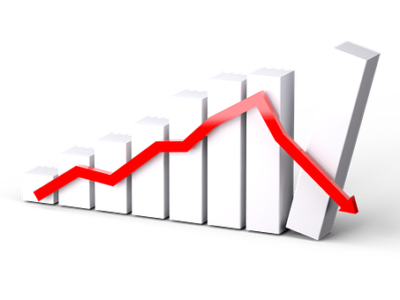The Career Dangers of Leverage for a Banker
Most people will see the phrase “the dangers of leverage” and view it in the context of financial leverage.
Basically, financial leverage refers to the use of debt to acquire additional assets. By borrowing money, you can control or own a greater amount of assets. In the case of investments, it allows for the returns to be amplified.
At the same time, if it goes wrong it can amplify the losses. We see it all the time. Individuals overstretch themselves with too much financial exposure when they think the good times will last forever. Recessions are very good at sniffing them out.
But let’s step away from financial leverage for a second. Let’s look at the dangers of leverage more holistically in the context of your career and how you might be taking on more risk than you imagine. It’s about how overly reliant you may be on your job for generating positive returns in life.
Yes, it can be about money. That’s a big one. But you may also find yourself too invested in different ways – emotionally and socially, for example. And it’s really about how this impacts you when things go wrong out there. Recession, coronavirus, market downturn, whatever.
Let’s Start With a Story
So cast your mind back to the financial crisis. Stock markets were in a state of panic. Banks were crumbling around our ears. Governments were stepping in to provide stability and confidence in the financial system.
Back then, I was working for the Royal Bank of Scotland. Formerly a small, parochial institution, RBS had transformed itself into a banking giant through an aggressive acquisition strategy over the previous decade.
Very briefly it was the biggest bank in the world. And we were made to embrace that. Its CEO, Fred Goodwin, was given a knighthood. Known as “Fred the Shred” for his aggressive job cutting strategy, he also named European Banker of the Year in 2003.
But this fairy tale didn’t end well. One over-leveraged acquisition too far and RBS was in a downward spiral. The problems dated back to the £49bn record-breaking takeover of Dutch bank ABN Amro in 2007. In April 2008, RBS tried to boost its finances through a £12bn cash call but this was not enough to prevent it from needing a bailout.
We were given the standard corporate BS reassurances by senior management at the time, but most people sensed things were bad. The subsequent overnight rescue of the bank by the British government spoke volumes. And not only would the bank have gone under, but so too would have the UK economy. The taxpayer, eventually, stumped up £1trn in assorted loans, equity stakes and debt write-offs.
Many jobs were lost. And of course, the stock price collapsed and is still less than one-tenth of the value of what it was in the heady days. Shambolic.
That’s the context. One messed up bank.
Anyway, when things were really getting bad, I remember having a conversation with a friend of mine at the bank. Let’s call him Bob. Bob had been at the bank close to two decades, had a senior role, had met his wife there, has moved to Asia for a role, had taken every annual bonus in bank shares, had invested more in company stock, had his pension with the bank….
As you can imagine, Bob wasn’t in the happiest of places during this period of struggles for the bank. He’d gone all-in with the bank, shown considerable loyalty and was left to face a less financially secure future. And this situation illustrated my original point. Leverage. Bob was so heavily invested in the bank’s fortunes, its failures were more heavily felt by him and his wife than for most people.
The more your fortunes hinge on those of your employer, the higher your level of leverage. This speaks for all types of firms. Just ask the former employees of Enron, WorldCom and Nortel. But banks infected each other during the financial crisis, which shows why there’s little escape.
So how should you think about adapting to the situation?
Look at Your Career
If we see another mother of all financial crises, you can forget about job security. 2008 and 2009 will tell you that.
We can’t all just leave our jobs and jump into a completely different career. Exciting. But fanciful. Still, maybe it’s the right time to start upskilling and re-skilling. You can see whether you can improve your capabilities in your current field, or you can see whether you can adapt to something entirely different. You could also consider a side hustle in an unrelated field, if only to give you some diversification in income.
If your spouse also works in the industry, you can’t just ditch them to reduce your concentration risk as you could with an investment. That would be just weird.
Still, he or she should also look at ways in which to reduce the risk that comes with a hit to your organization. Maybe one of you could look for a role at another institution. Maybe not ideal but it’s worth consideration.
Look at Your Investments
What you don’t want to be doing is doubling down on one bet.
If all your stock market investment eggs are in the same basket, then good luck. If you’ve been stockpiling your company’s stock over the years, then I wish you even more luck.
None of us can see into the future. But if market conditions do turn bad, really bad, you don’t want to see a massive hit to your finances at the same time as you lose your job.
So keep a bit more cash in your emergency fund. There’s no shame in keeping a healthy buffer, even if financial advisors would tell you otherwise.
Diversify your investments away from just the stock market until other alternatives like real estate or gold. Cut your costs if you can.
Look at Your Friends
This is much more about the emotional impact of a crisis and how you work through it.
Who do you hang out with socially? If your whole social circle is your workmates, have a think about it. There’s nothing fundamentally wrong with this. But what’s the mood like down the pub when the markets or your bank has had another bashing?
And what you don’t want are nights of panic and despair. That’s what it will be during the bad times if your only social outlet is your work friends.
I’m not exaggerating. That’s exactly what it was like in 2008. Depressing.
So branch out a bit. Find friends that don’t do finance. Find those that quite frankly don’t care at all about what’s happening in that world (even if they don’t realize that it does indirectly impact them).
Look at Your Lifestyle
This one’s partly about money.
Do you live a “banker” lifestyle? I’m not entirely sure what that is, mind you. Bankers come in all kinds of stripes. But that doesn’t stop the media and Hollywood from painting a picture for so many to aspire to.
It’s far from The Wolf of Wall Street for most. Just like an airforce cadet wouldn’t expect Top Gun chic as par for the course. Still, if you hang out in a certain crowd (see above) and identify with a way of being, you may find yourself down a specific lifestyle path.
And that path might not come cheap. Club membership, flashy car, oversized house. These all become part of your identity – an identity that comes crumble at the first whiff of severe market turmoil.
It’s important to see “leverage” here as to how your role and career represent a substantial part of your social worth. What you own, how people see you, how you like to project yourself. If you identify too heavily with your job and it goes, what have you got left?
As hard as it can be, you really don’t need to keep up with the Joneses.
Whoever you’re comparing yourself to could be living one big fat charade, which may only come to light when the market crashes. As the investor Warren Buffett has said in the past, “You never know who’s swimming naked until the tide goes out.”
Yes, those Joneses might seem to have the trappings of a cool lifestyle nailed. But you don’t know whether they are criminals, faking it or are drowning in debt.
Then again, maybe they’re genuinely rich – maybe they won big on the lottery or have a very generous aunt. It really doesn’t matter. That’s their story.
In other words, don’t get sucked into unnecessary spending aimed at projecting (an unstable) status.
Look at Your Identity
Connected to your lifestyle is your identity – how you see yourself in this context.
Yes, we’ve seen the post-financial crisis banker bashing. But there’s still plenty of kudos when you say you work in finance. There’s the social standing that comes from it being a “respectable” career.
At the same time, you’ve also got to look at how you identify with all of this. It’s very easy to get lost in this identity. True, you can make the same case for many careers. Doctors, lawyers, architects and everything in between all have a cache. But few carry the same kind of leverage – leverage where your employer is so intertwined with financial markets and stock market behavior.
So take on board that you are more than just a private banker, credit analyst or investment advisor. Your business card might impress at cocktail parties. It may open doors for you. You may even get a hit of dopamine every time someone looks impressed. But don’t get trapped by labels.
You have to realize just how transitory your title ultimately is in the bigger scheme of life. Yep, being too anchored to what you feel your role and the industry represents for you will only hurt more with any seismic change in the work climate. You may be exposing your life to a single point of failure in your career.
Focus on things that resonate on a deeper level. Your beliefs. Your core values. Things that actually matter. That will allow you to be less leveraged to what has worked for you in the past when faced with an uncertain future.







